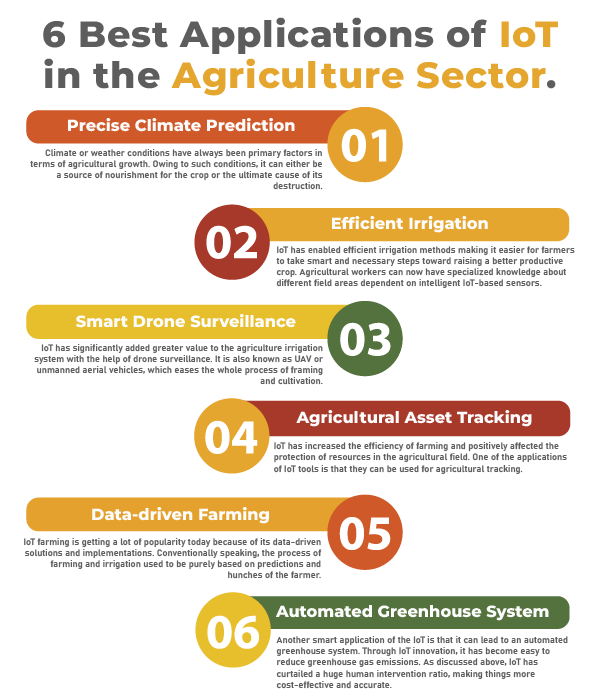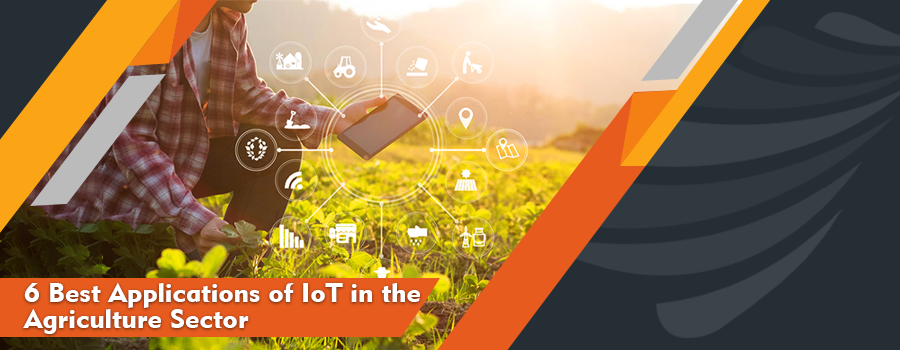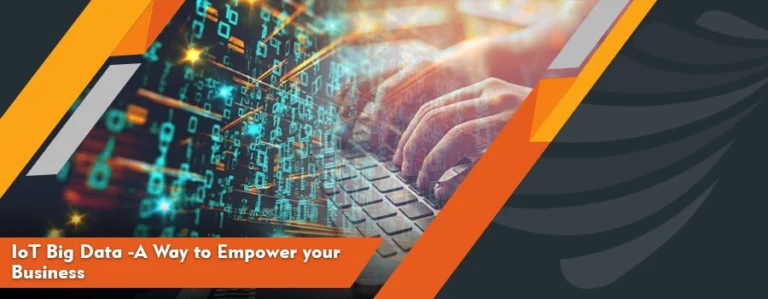IoT, which means “Internet of Things,” has encircled the whole world in its fast and manual-free network by making things digitally available, and operative. It has conquered almost every sector of both social and economic spheres, especially agriculture. IoT in agriculture has dramatically boosted the industry’s way of working and operations.
IoT is about canceling out or minimalizing manual hand-involved actions by replacing their work with smart sensors. A simple tap on your smart device will perform your desired action or activity.
Due to IoT-based solutions, technology and innovation are increasingly revolutionizing the agriculture sector. This is further helping a country become economically stable. Nevertheless, to speak in detail about IoT in agriculture, the six best applications in the agriculture sector are below.

1. Precise Climate Prediction
Climate or weather conditions have always been primary factors in terms of agricultural growth. Owing to such conditions, it can either be a source of nourishment for the crop or the ultimate cause of its destruction. Before IoT or technological advancement, there were only a few or almost no techniques for predicting weather conditions, which could have a disastrous effect on the hard work of a farmer’s crop. Later, with IoT’s emergence, people can now have precise climate prediction, which helps them make the best decision for their crops. IoT mainly works on sensors, which can be put inside and outside the agriculture field. It helps a farmer get the real-time condition of the weather like rainfall or humidity, etc. It assists the agriculture worker to reap better benefits from their crops, as they are fully aware of the situation, including the crop and the climate surrounding it.
2. Efficient Irrigation
IoT has enabled efficient irrigation methods making it easier for farmers to take smart and necessary steps toward raising a better productive crop. Agricultural workers can now have specialized knowledge about different field areas dependent on intelligent IoT-based sensors. In this way, they can individually provide requirements for the crop, for instance, whether it needs more water or more fertilizers, etc. In other words, IoT has made the irrigation process easy and efficient.
3. Smart Drone Surveillance
IoT has significantly added greater value to the agriculture irrigation system with the help of drone surveillance. It is also known as UAV or unmanned aerial vehicles, which eases the whole process of framing and cultivation. They can be used for multiple purposes, including agriculture spraying, planting crops, fighting pests and infections, spreading fertilizers & crop monitoring, etc. Through them, farmers can save a huge amount of time and prevent wasting manpower. You can check crops’ health conditions through the agricultural data collected from these drones.
4. Agricultural Asset Tracking
IoT has increased the efficiency of farming and positively affected the protection of resources in the agricultural field. One of the applications of IoT tools is that they can be used for agricultural tracking. With IoT sensors and tracking equipment, we can also keep in check the health of the livestock and cattle. Farmers can quickly help collect data on stock’s well-being and real-time physical location.
TrackPro is a state-of-the-art IoT-based technology through which one can keep track of the equipment, tools, and assets, especially of vehicles like mowers, combines, tractors, balers, plows, sprayers, planters, etc. This will prevent theft and misplacement, which could ultimately slow down the irrigation process.
5. Data-driven Farming
IoT farming is getting a lot of popularity today because of its data-driven solutions and implementations. Conventionally speaking, the process of farming and irrigation used to be purely based on predictions and hunches of the farmer. This makes harvesting less reliable, from sowing the seed to plucking the fruit. Also, this could further reduce the chances of a field producing the crop with its full potential. Nonetheless, things have changed drastically as different IoT-based solutions are data-driven and provide smart analysis of the situation. With the help of predictive analytical tools, the agriculture irrigation system has become more efficient as the data can errorlessly be analyzed within a short period. Since the calculation or analysis involves fewer humans and is done by AI-based tools, the results are more reliable and likely to increase harvest production.
6. Automated Greenhouse System
Another smart application of the IoT is that it can lead to an automated greenhouse system. Through IoT innovation, it has become easy to reduce greenhouse gas emissions. As discussed above, IoT has curtailed a huge human intervention ratio, making things more cost-effective and accurate. Now, with the help of solar-power IoT solutions, we can build inexpensive, smart greenhouses. Also, we can maintain greenhouses without even breaking a sweat owing to the intelligent tech-based sensors. Different relevant real-time data can now be achieved on devices with the help of email or SMS notifications or alerts. Agricultural workers can get information regarding water consumption, humidity, light, and temperature level to make wise and data-driven decisions.
Probable Impacts of IoT on Agriculture
Adoption or inclusion of IoT solutions will be very beneficial for the entire agriculture sector. Owing to its smart sensors and data-driven methodology, farmers can witness a better quality of crops with a higher ratio of yield. Moreover, it has improved the understanding of farmers over their crops while guiding them through the entire process of irrigation. It has ensured that human society reaps the fullest potential of agricultural benefits.
To Sum Up:
To conclude, IoT has great applications in the sector of agriculture. It has positively revolutionized agricultural operations by making things cost-effective and proficient. Indeed, IoT-based practices and implementations will not only guarantee the suitable health of the crop but will also increase the overall production. Plus, such agritech implementations have ensured the full potential of crop production and guaranteed food and farming equipment security and surveillance.





